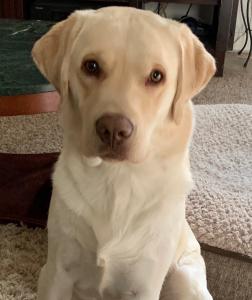Labrador Retriever Received VetStem Cell Therapy for Fragmented Coronoid Process in Elbows
Niko, a Labrador retriever, was successfully treated with VetStem Cell Therapy in conjunction with surgery for fragmented coronoid process (FCP) in his elbows.
POWAY, CA, US, November 1, 2022 /EINPresswire.com/ -- Nikolai Augustus, a Labrador retriever, was 2 years old when he began limping. X-rays revealed he had broken bone fragments in both of his elbows as a result of fragmented coronoid process, or FCP. FCP is one of the main diseases associated with elbow dysplasia. It is a developmental defect of the two small bony protrusions on the end of the ulna, known as the coronoid processes, within the elbow joint. In this condition, one of the bony protrusions develops a fissure or crack and separates from the ulna. FCP may result in instability and pain as well as decreased mobility and swelling.
The treatment of choice for FCP is surgical removal of the bone fragments and any abnormal cartilage. This procedure can be performed arthroscopically by an orthopedic surgeon, which results in a smaller incision and less damage to the supporting elbow structures. In all cases however, regardless of surgical repair, the patient will develop some degree of arthritis.
Fortunately for Niko, his veterinarian recommended arthroscopy in addition to treatment with VetStem Cell Therapy. Stem cells are regenerative cells that can differentiate into many tissue types and have demonstrated the ability to reduce pain and inflammation, help to restore range of motion, and stimulate regeneration of tendon, ligament, and joint tissues. In a peer-reviewed study of dogs with chronic osteoarthritis of the elbow, it was found that treatment with stem cells reduced pain and lameness. By using VetStem Cell Therapy in conjunction with surgery, Niko’s vet hoped to delay the progression and reduce the severity of degenerative joint disease in his elbows.
To begin the process, Niko’s vet collected fat tissue from his abdomen in a minimally invasive anesthetic procedure. The fat was aseptically packaged and shipped to the VetStem processing laboratory in Poway, California. Lab technicians processed the fat to extract and concentrate the stem and regenerative cells contained therein. The cells were divided into doses, and two injectable doses were shipped to Niko’s vet for treatment. Approximately 48 hours after the initial fat collection procedure, Niko received one dose of his own stem cells into each elbow.
According to Niko’s owner, he had a great response to the treatment. His owner stated, “One year after surgery and stem cell therapy and Niko is running and playing with the energy of a 3-year-old. We are thankful our vet recommended stem cell therapy for Niko and that he has the bank of stem cells to help treat Niko in the future.”
In addition to the two stem cell doses that were shipped for immediate treatment, several doses of Niko’s stem cells were put into cryopreservation. This is particularly valuable for a patient like Niko who will never have perfect, arthritis-free elbows. In fact, approximately 15 months after his initial treatment, Niko received a follow up treatment identical to his first using some of his banked stem cell doses. Niko’s additional cells will remain in cryopreservation and can be accessed for treatment as needed for the remainder of his life. Learn more at www.VetStem.com.
About VetStem, Inc.
VetStem is a veterinarian-led Company that was formed in 2002 to bring regenerative medicine to the profession. This privately held biopharmaceutical enterprise, based near San Diego, California, currently offers veterinarians an autologous stem cell processing service (from patients’ own fat tissue) among other regenerative modalities. With a unique expertise acquired over the past 15 years and thousands of treatments by veterinarians for joint, tendon and ligament issues, VetStem has made regenerative medicine applications a therapeutic reality. The VetStem team is focused on developing new clinically practical and affordable veterinary solutions that leverage the natural restorative abilities present in all living creatures. In addition to its own portfolio of patents, VetStem holds exclusive global veterinary licenses to a large portfolio of issued patents in the field of regenerative medicine.
Kristi Hauta, Director of Commercial Operations
VetStem, Inc.
+1 858-748-2004
email us here
Legal Disclaimer:
EIN Presswire provides this news content "as is" without warranty of any kind. We do not accept any responsibility or liability for the accuracy, content, images, videos, licenses, completeness, legality, or reliability of the information contained in this article. If you have any complaints or copyright issues related to this article, kindly contact the author above.

